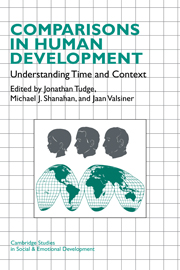Book contents
- Frontmatter
- Contents
- List of Contributors
- Comparisons in Human Development: To Begin a Conversation
- Part One Metatheoretical Approaches to Developmental Comparisons
- 1 Developmental Research and Comparative Perspectives: Applications to Developmental Science
- 2 Developmental Concepts across Disciplines
- 3 Ecological Perspectives in Human Development: A Comparison of Gibson and Bronfenbrenner
- Part Two Paradigmatic Statements
- Part Three Comparisons at the Level of Data
- Part Four Commentaries
- Author Index
- Subject Index
3 - Ecological Perspectives in Human Development: A Comparison of Gibson and Bronfenbrenner
Published online by Cambridge University Press: 04 May 2010
- Frontmatter
- Contents
- List of Contributors
- Comparisons in Human Development: To Begin a Conversation
- Part One Metatheoretical Approaches to Developmental Comparisons
- 1 Developmental Research and Comparative Perspectives: Applications to Developmental Science
- 2 Developmental Concepts across Disciplines
- 3 Ecological Perspectives in Human Development: A Comparison of Gibson and Bronfenbrenner
- Part Two Paradigmatic Statements
- Part Three Comparisons at the Level of Data
- Part Four Commentaries
- Author Index
- Subject Index
Summary
In this chapter we provide a brief overview of ecological perspectives as they relate to human development, as the background to more extensive discussion of the perspectives taken by two theorists, James Gibson and Urie Bronfenbrenner. Despite their very different foci (Gibson being concerned primarily with perception, Bronfenbrenner with social contexts) and their different levels of analysis, they share basic assumptions and, we shall argue, their perspectives should be viewed as complementary. The assumptions that they share derive from their acceptance of an ecological perspective.
What is an ecological perspective? It is a standpoint for conceptualizing the changing maturing person in relation to a changing environment — social, physical, and psychological. The ecological perspective is shared with other frameworks within which human development is considered, ranging from cultural psychology as represented by Shweder (1990), Rogoff (1990), and Valsiner (1989), through the co–constructionist perspective on development (Tudge, Putnam, & Valsiner, in press; Wozniak, 1993), and encompassing developmental psychobiology (Gottlieb, 1992, in press; Johnston, 1985). Although the ecological perspective, and the term ecology, originated (at least in modern day science) in biology, its use spans several disciplines, among which is developmental psychology. There, it is linked most notably to the work of James Gibson and Urie Bronfenbrenner. For both of these theorists an ecological perspective has unique meaning, yet fundamentally they share a belief in the necessity of viewing the individual and the environment as they relate to and define each other. They have built their theories upon this premise.
- Type
- Chapter
- Information
- Comparisons in Human DevelopmentUnderstanding Time and Context, pp. 72 - 106Publisher: Cambridge University PressPrint publication year: 1996
- 7
- Cited by



